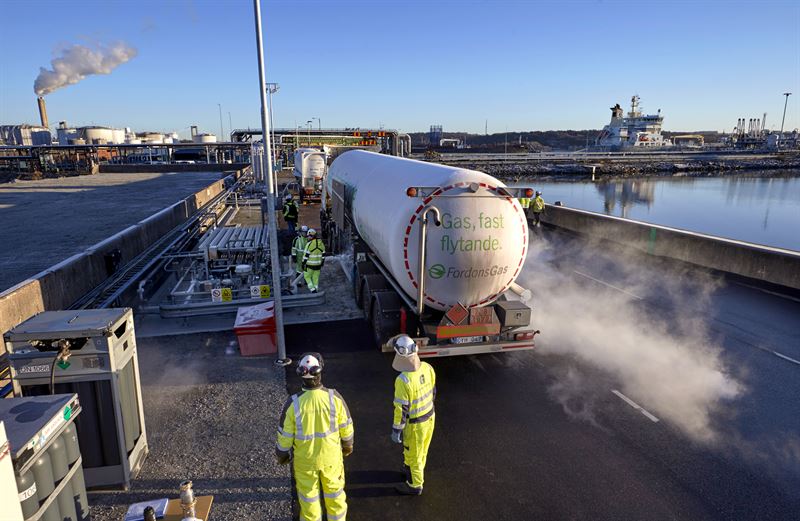New agreement between Swedegas and FordonsGas – Liquefied biogas brings further climate benefits to Gothenburg shipping

Bunkering liquefied biogas, LBG, at the Port of Gothenburg has become significantly easier for the shipping sector. A new agreement between FordonsGas and Swedegas will ensure access to this renewable fuel, a move that has been sought by both shipping companies and their customers.
Shipping needs to make the transition from oil to environmentally smart alternatives. Liquefied natural gas, LNG, is currently the cleanest marine fuel available due to lower emissions of carbon dioxide, sulphur oxide, nitric oxide, and particulates. With renewable liquefied biogas, LBG, climate benefits will increase even further with the addition of net-zero carbon emissions. Since autumn 2018 there has been a permanent bunkering facility for liquefied gas at the Port of Gothenburg, owned and operated by Swedegas. From the outset, both LNG and LBG could be bunkered.
The facility at the Port of Gothenburg offers open access to all suppliers looking to provide the shipping sector with the opportunity to bunker liquefied gas. FordonsGas, part of the Air Liquide Group, is the only producer of LBG in Sweden. Under the agreement with Swedegas it will supply liquefied biogas to the recently opened facility.
“We deliver solutions for sustainable mobility and we are looking forward to being part of the investment in LBG for the maritime sector. Making LBG available to shipping is a natural development for us, and through the agreement with Swedegas we have made a firm, long-term commitment,” said Emil Glimåker, Director Nordic Countries, Air Liquide Advanced Business & Technology. He also highlights the fact that LBG is produced locally:
“Thanks to our high-tech solutions, we can produce liquefied biogas at our facility in Lidköping, just 130 km from Gothenburg. Such a short transport distance generates both environmental and climate benefits.”
For Swedegas, the agreement means yet another supplier is in a position to offer liquefied gas, raising the proportion of renewables even more. This is welcomed by both shipping companies and transport purchasers.
“We are pleased that we can present Swedish shipping with the opportunity to not only make the transition to liquefied natural gas, but also to gradually increase the proportion of renewable gas. Every step towards more sustainable transport is vitally important,” said Johan Zettergren, Swedegas chief executive, who stresses how big a step it is for shipping to make the transition from oil to liquefied gas:
“Emissions from shipping have an impact on the marine and air environment, both out at sea and in port, and in particular the work environment on board the vessels. With LNG as a fuel, emissions can be cut significantly compared with the most common marine fuels currently in use. And with LBG there is the added benefit of net-zero carbon emissions.”
For further information, please contact Saila Horttanainen, Vice President, Communications and Sustainability, Swedegas, +46 70 622 76 06, or Emil Glimåker, Director Nordic Countries, Air Liquide Advanced Business & Technology, +46 70-680 71 00.
Fact file
Liquefied gas. With liquefied gas as a marine fuel, emissions of sulphur oxides and particulates are reduced by 99 per cent and nitric oxide emissions by 90-95 per cent. LBG, liquefied biogas, is a 100 per cent renewable fuel produced from a variety of sources, including organic waste, and with zero-net carbon emissions. Liquefied natural gas (LNG) reduces carbon emissions by 20-25 per cent when compared to conventional marine fuels.
Swedegas invests in smart gas infrastructure and owns and operates the gas network along the west coast of Sweden as well as the liquefied gas bunkering facility at the Port of Gothenburg. Swedegas is working to ensure that 30 per cent of the energy in the company's system will be renewable by 2030. According to the Gas Barometer, the proportion of renewable gas in the network in 2018 stood at 20 per cent.


